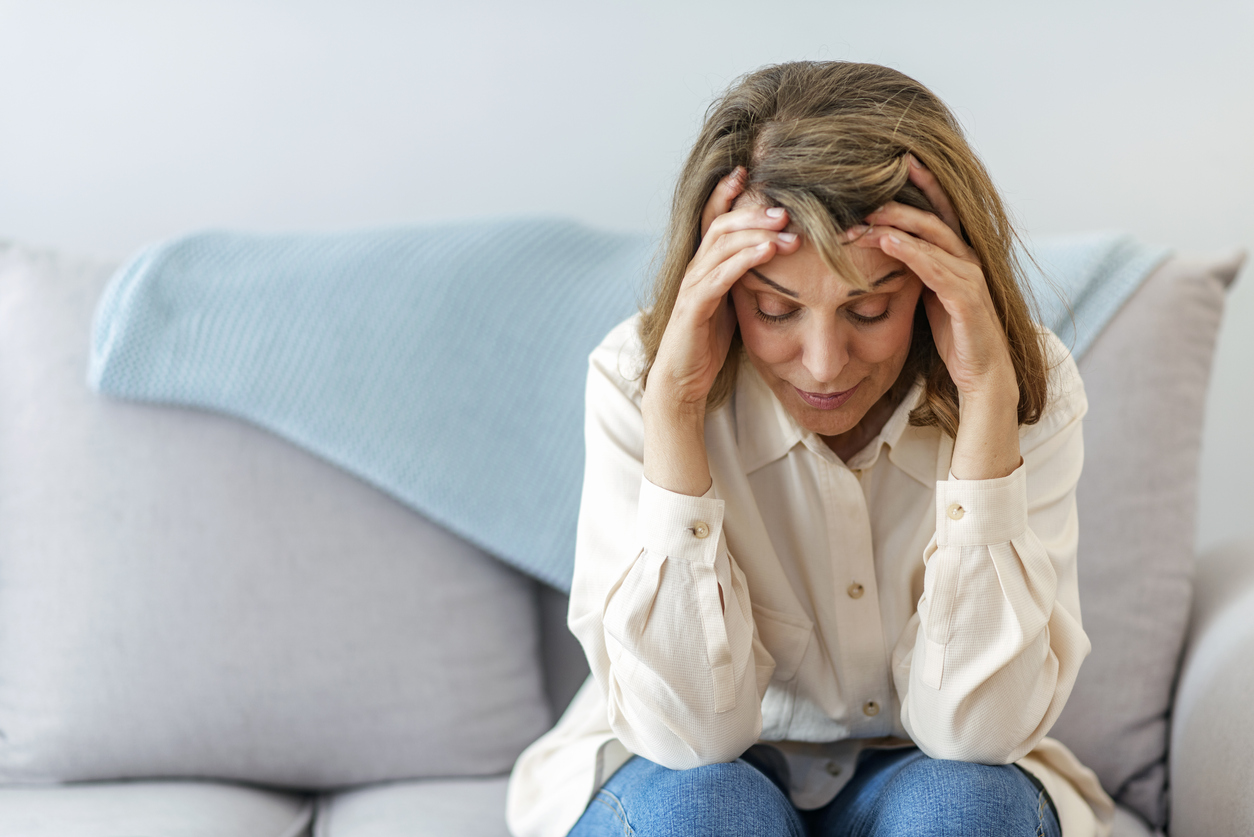Dr Ruslana explains how menopause can affect your psychological health
Many women describe experiencing ‘brain fog’ during menopause and think that symptoms such as forgetfulness and increased anxiety are signs of them getting old or ‘going mad’. However, many of these symptoms can be attributed to the hormonal changes that take place during menopause.
What psychological symptoms are associated with menopause?
Women can experience many different psychological symptoms during menopause. These include low mood, anxiety, a lack of motivation, fatigue, poor sleep, and cognitive dysfunction, for example difficulty concentrating or forgetfulness. Women also report feeling ‘useless’, having a lack of confidence and a low libido. Symptoms of irritability and agitation are also common.
Are mental health problems a normal part of menopause?
These symptoms are often a part of menopause and it is something that we often see in clinic.
These emotional symptoms can be compounded by the physical symptoms of menopause, for example, hot flushes, sweating and weight gain. Also, menopausal women are often going through other significant life changes, for example children leaving home, or caring for elderly parents, which can further impact their mental health.
What is important is that women do not feel that they are alone in having these feelings. It is a normal part of menopause that most women will experience. By understanding that it is your hormones that need support, you can be empowered to help yourself.
What hormones are responsible for these symptoms?
Hormones regulate every function in our body, from intellect to energy, from mood to metabolism.
As we go through menopause, levels of oestrogen, progesterone and testosterone decline, and these changes have a direct impact on the way our brain functions.
Oestrogen and progesterone both play important and varied roles within the central nervous system (CNS) by regulating chemicals, known as neurotransmitters. Neurotransmitters are responsible for regulating our mood, emotions and overall cognitive function (i.e. our ability to remember and learn).
Role of oestrogen
Oestrogen helps to maintain our memory, concentration and mood. It assists in the formation of neurotransmitters such as serotonin, which decreases depression, irritability and anxiety. This is one of the reasons who some women suddenly develop anxiety and panic attacks when they head towards menopause.
Oestrogen also increases the amount of dopamine in the brain, which is responsible for regulating pleasure, motivation and learning.
Role of progesterone
Progesterone keeps us happy, calm and balanced. Progesterone has this calming effect because it relieves tension in the body by working as a diuretic (decreasing fluid retention) as well as enhancing GABA-a major neurotransmitter that calms the nervous system and prevents anxiety.
Progesterone also suppresses the action of another neurotransmitter, glutamate. This is an excitatory neurotransmitter that stimulates brain activity, and high levels of glutamate have been linked with increased anxiety.
Role of testosterone
Testosterone is the hormone responsible for our sense of well-being; it gives us confidence, energy and the ability to withstand stress. Since testosterone levels decline during menopause, this can explain some symptoms, including low confidence, low motivation and fatigue.
How can cBHRT help with mental health?
Bio-identical hormones have the same chemical and molecular structure as the naturally occurring hormones produced in human body. As a result, they fit their hormone receptor sites perfectly and produce effects consistent with the normal biochemistry of the body. Another benefit of these hormones that their combinations can be tailor-made specifically for each person’s needs.
What other advice do you offer to women experiencing psychological symptoms / mental health issues?
Living a healthy lifestyle, with regular exercise and a balanced diet is a good advice for all patients, regardless of the menopause but it is paramount during this period in our lives.
Quite often a modest lifestyle modification can have a significant positive impact of one’s functioning: learning a new skill, practising mindfulness, doing exercises, such as yoga and Tai Chi, have shown to be effective in studies.
A balanced diet, low in sugar, caffeine and alcohol, is also recommended. Studies have shown that the Mediterranean diet, full of ‘good fats’ and fresh produce, is particularly beneficial for cognitive function.
Adding supplements such as Omega -3, magnesium, vitamins B can be beneficial too, however I would recommend consulting with a naturopath or a doctor.


